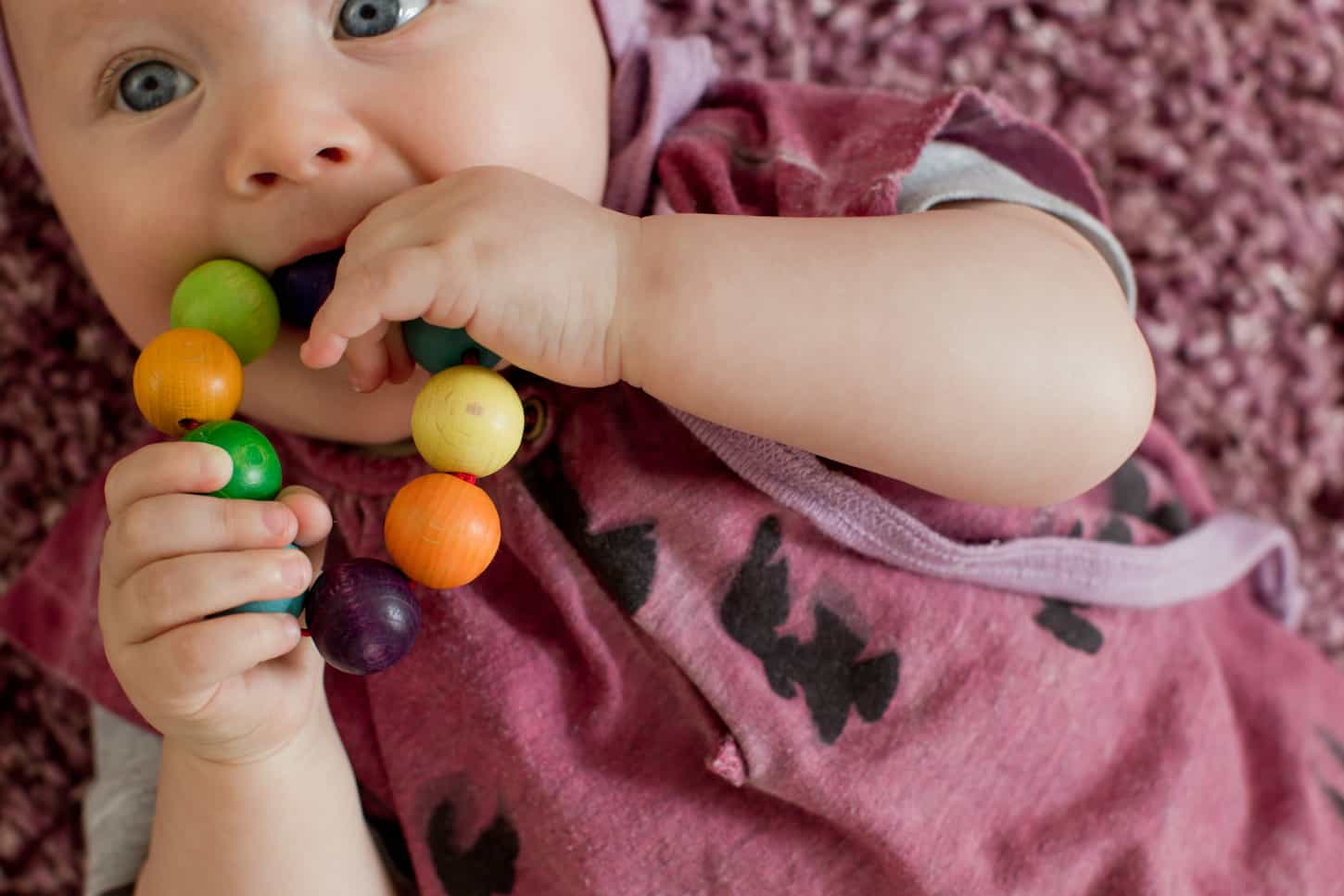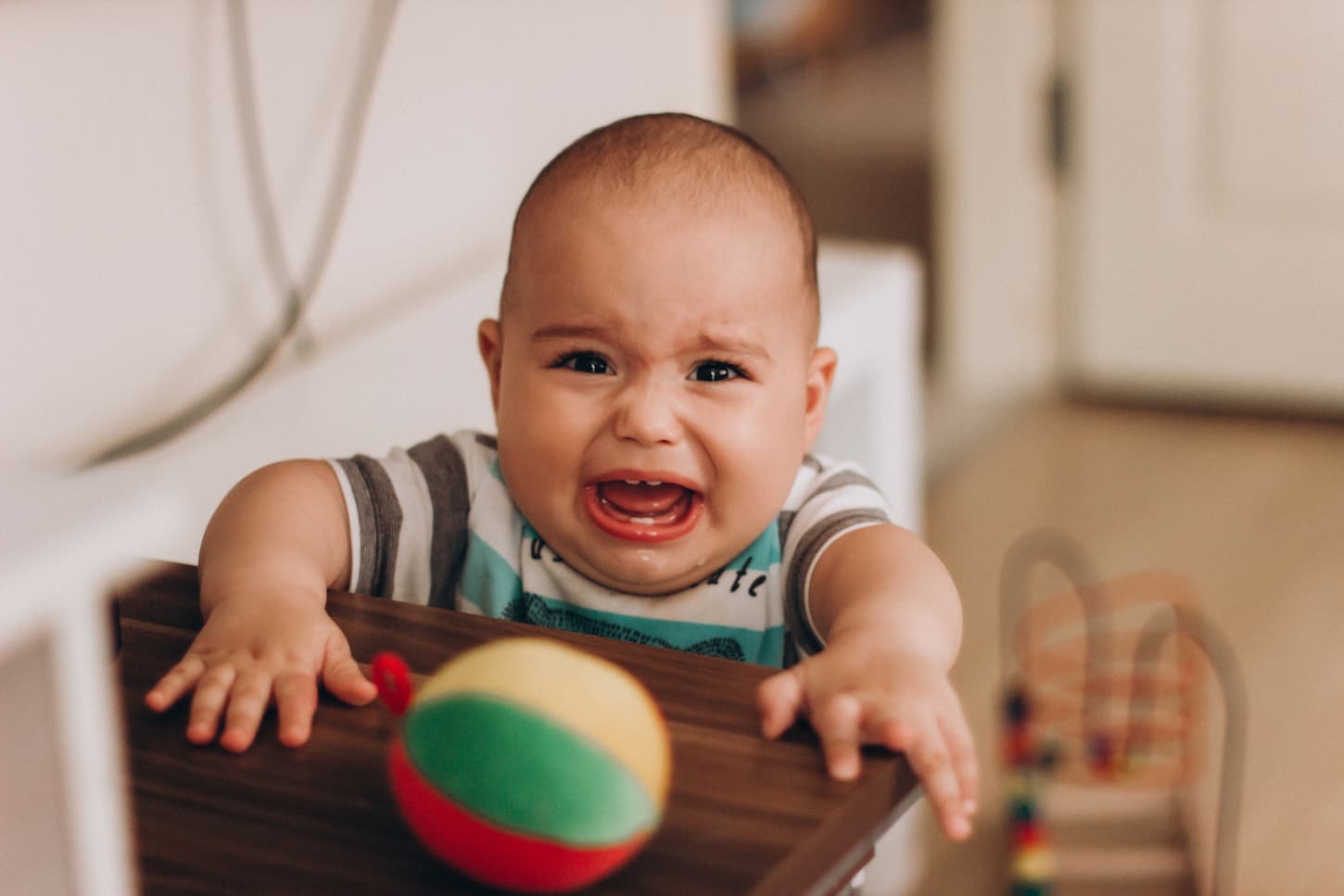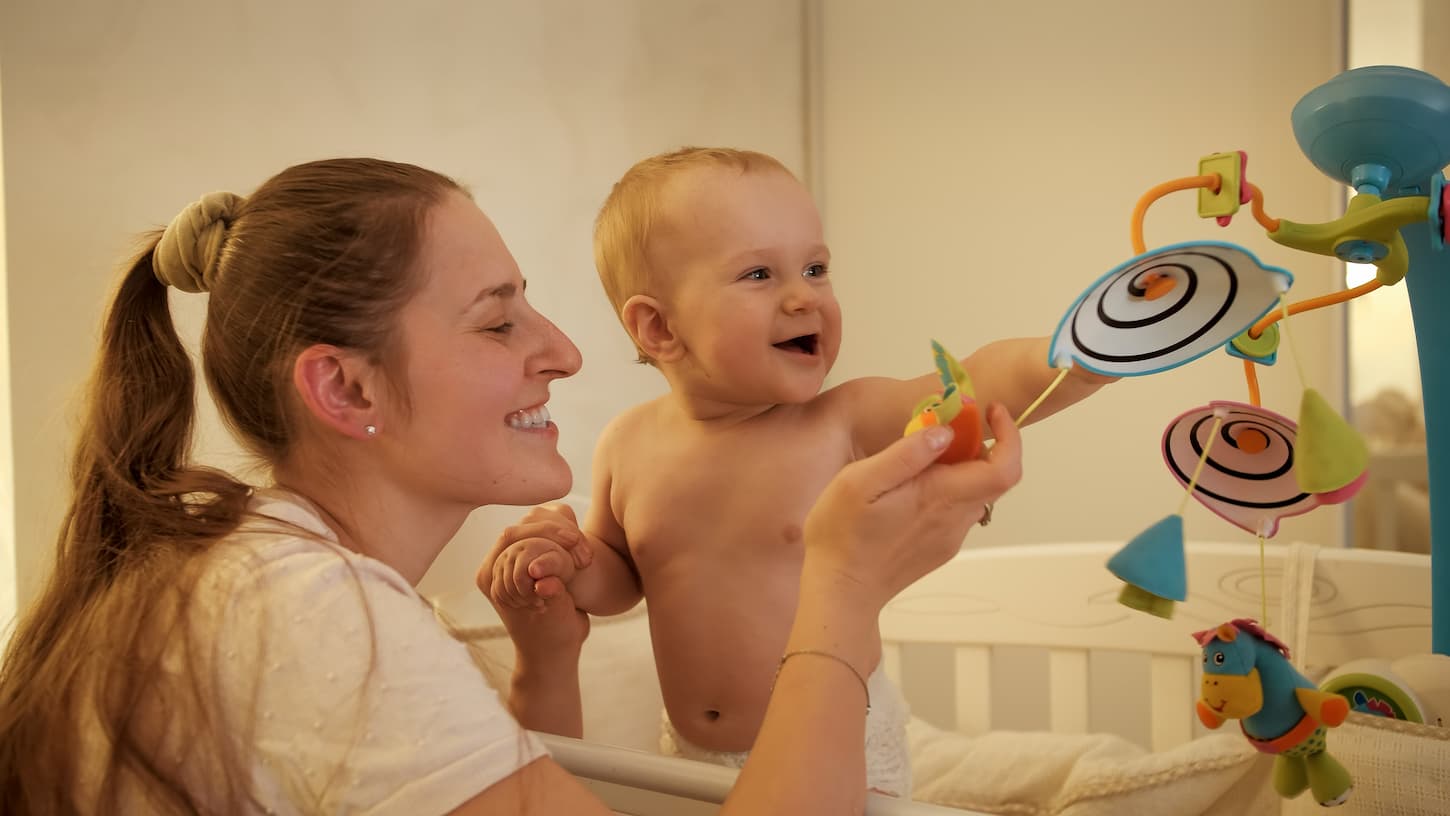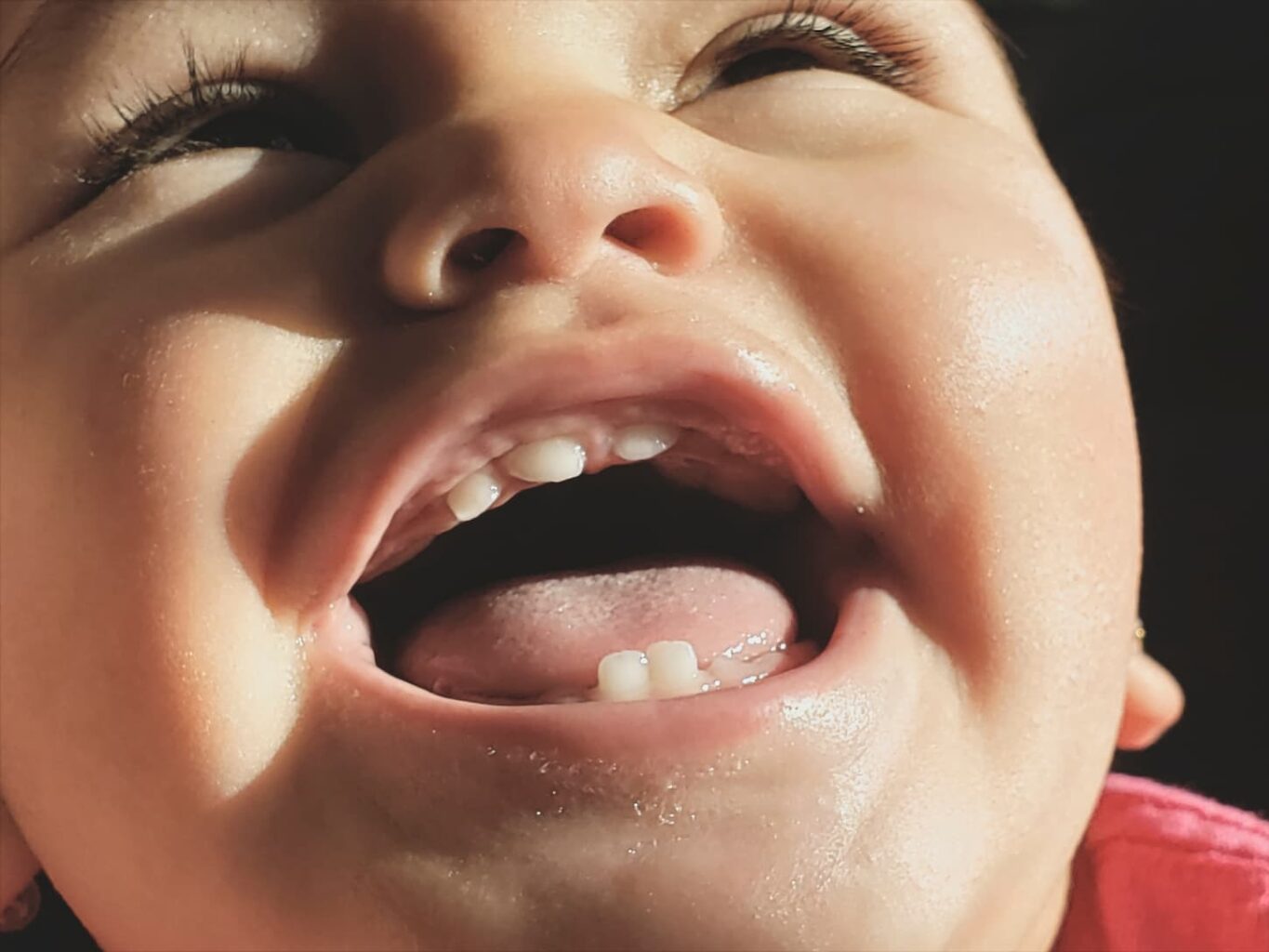Sleep training your baby takes a lot of effort, and you’ll come across many unexpected hurdles along the way. All kinds of things can disturb your baby’s sleep training, including teething. And if you’re wondering how to maintain sleep training when your baby’s teeth are coming through, you’re not alone.
Not all babies’ sleep will be disturbed by teething. But if your baby is waking during the night from teething, try and stick to your sleep training routine as much as you can. Be flexible with the routine but try not to make any drastic changes.
Even though it may be tempting, don’t abandon your sleep training efforts when your baby’s teeth are coming through. Having a good bedtime routine will help to comfort your baby during the teething process. And if you want to know exactly how to stay on top of sleep training when your baby is teething, take a look at this vital information below.

What Exactly is Teething?
Your baby’s teeth generally start coming through beginning at 4 to 5 months old, though some babies don’t get their first teeth until after they’re a year old. It takes up to two years for all of their teeth to come through. But this doesn’t mean that your baby will have teething pain for two years straight.
Teething happens in two stages, sometimes known as chronic and acute teething.
Chronic Teething
Chronic teething is when your baby’s teeth move up through the jaw, ready to pop out of the gum. During chronic teething, your baby will often start drooling a lot but won’t produce any teeth. And your baby usually won’t have pain with chronic teething.
Acute Teething
Acute teething is when your baby’s teeth start to pop through the gum. And it usually takes 1-3 days for the tooth to appear. This is the most painful part of teething and often, it can affect your baby’s sleep.
Sometimes you won’t know for sure if the pain is from teething until you see the tooth come through. So, it can be very easy to misdiagnose acute teething.
How Often Do Babies Go Through Teething?
Your baby may start showing signs of chronic teething at around 4 months old. But the first teeth don’t usually appear until closer to six months. Your baby will then get more teeth through at around 10, 15, and 24 months.
This is because it would be too painful if all your baby’s teeth came through all at once. So instead, they usually come through in batches at steady intervals.
- At 6 Months – Your baby will get their first teeth called the central incisors. These are the cute ones that sit in the middle of their lower jaw.
- At 9 – 11 Months – A whole load more teeth will come through. Your baby will get their upper central incisors as well as their upper lateral and lower lateral teeth.
- At 15 Months – The first molars come through. These are the big, square teeth at the back of the mouth that we use to chew food.
- Two Years – This is when the second molars come through. This can be a tough teething session because it often coincides with the two-year sleep regression.
Keep in mind that this is the usual and that some children will not match this.
For example, my children didn’t start getting teeth until they were at least a year old. My oldest took things a step further and got his molars first at 15 months old. Then, he got all of the rest of his toddler’s teeth within 2-3 weeks. It was a rough few weeks!
Is Teething Worse at Night?
The overall medical consensus is that teething isn’t necessarily any worse at night. However, your baby will be more irritated by it when it disturbs their sleep. Additionally, during the night there are fewer distractions to take your baby’s mind away from the pain.
During the day your baby will generally be more upbeat and in a better mood, so they will deal with the discomfort of teething much better. When they’re tired and sleepy they have less patience and energy for dealing with the pain. So, this is why teething often seems much worse at night.
Can Teething Cause Baby Cry in Their Sleep?
Teething will certainly cause some babies to cry in their sleep, but this will only be in severe cases. Some studies suggest that teething isn’t all as painful as it seems, but most parents may disagree and believe it does cause painful cries at night.
Studies also suggest that parents often misdiagnose teething. And that, sleep disturbances may be due to something else instead. This doesn’t mean that teething symptoms aren’t real, but they should only last for around two days – or a maximum of eight in severe cases.
If your baby’s teething is going on for over a week, this could mean the sleep regression is due to something else instead. So, if your baby has had severe teething symptoms for over a week, you should speak to your physician.

How Do I Know If My Baby Is Waking from Teething?
If your baby is teething, usually it will be accompanied by a whole load of other symptoms. So, it’s important not to misdiagnose something else for teething. Therefore, waking from teething is diagnosed by ruling out the other options.
There are lots of reasons why your baby might keep waking up at night, and teething is just one of them.
So, if your baby is waking up at night and they also have any of the following symptoms, chances are they’re waking up due to teething.
Teething Symptom #1: Drooling
This is a classic symptom of teething. And chances are, your baby will drool excessively during chronic and acute teething. Drool can irritate your baby’s sensitive skin. So, remove the drool regularly and invest in a few drool-absorbent bibs.
Teething Symptom #2: Chewing
When your baby is teething, they’ll want to put all kinds of things in their mouths. This is because chewing can alleviate the pressure on their gums. The best thing for your baby to chew on is a teething ring or toy. You can also let them chew on your fingers too.
Teething Symptom #3: Red Gums
During acute teething, your baby may have red, inflamed gums.
Teething Symptom #4: White Nibs
Just before the tooth comes out, you might be able to see it sitting just under your baby’s gums.
Teething Symptom #5: Disrupted Sleep
Teething can affect both daytime and nighttime sleeping patterns. This means your baby might have trouble settling or they may wake up more during the night. Sometimes they might find it hard to settle for naps too.
Teething Symptom #6: Flushed Face
When teeth are coming through, sometimes your baby’s face may become hot, red, and flushed.
Teething Symptom #7: Ear Pulling
Babies will often pull on their ears when they have teeth coming through.
Teething Symptom #8: Irritability
Another common sign of teething is overall irritability. Your baby may seem a bit under the weather and less interested in food.
Occasionally teething may cause other symptoms such as a mild fever, cough, diarrhea, and vomiting. In severe cases, you may have to give your baby medication for teething. But always seek professional medical advice before you give your baby medication.
How Can I Sleep Train If My Baby is Teething?
Teething is one of the things that will push your sleep training to the limit. And sometimes, it can cause a full-on sleep regression. To minimize the effect of teething on your sleep training, stick to your routine as much as you can. But don’t prioritize sleep training over your baby’s comfort.
It’s important to give your baby lots of comforts when they’re feeling ill. So if they’re genuinely in pain, don’t be afraid to pick them up and cuddle them. This closeness will help them to feel less stressed. However, try to avoid any drastic changes to your routine such as co-sleeping with your baby for comfort, unless you think they really need it.

How Do You Maintain Sleep Training When Baby is Teething?
During the stress of teething, don’t start any new sleep training practices, but try to maintain the ones you already have in place. You can do this by sticking to your baby’s bedtime routine as much as you can. Make bedtime extra soothing and have a pacifier on hand in case you need it.
During teething, you and your baby may be feeling cranky and sleep-deprived but sticking to a routine is one of the best ways to get through it in the long run. And here are our top tips to help you maintain sleep training while your baby is teething.
Tip #1: Keep Yourself and Baby Calm
It’s natural to feel stressed if you think your baby is in pain, but it’s important to keep calm. Your baby will pick up on your stress and this will make them feel stressed too. Remember, in most cases, teething may not be that painful and your baby might be crying more because they’ve had their sleep disturbed instead.
When your baby wakes up at night, keep the environment calm too. Don’t switch on all the lights. And use things such as white noise and lullabies to try and soothe your baby.
Tip #2: Offer Comfort
It’s important to comfort babies when they’re ill. However, babies are quick learners and know how to get our attention so try and use your instinct to feel if your baby really is in pain or not. You should comfort your baby but only if they need it. And give your baby the chance to self-soothe first.
Give your baby extra comfort at bedtime too. This could be with extra cuddles or rocking or you could give them a gentle foot massage. If you make bedtime extra soothing, this will promote deep sleep. So, there’s less chance that your baby will be disturbed by teething.
Tip #3: Give Them a Pacifier
If your baby wakes up in pain from teething, you can offer them a teething ring or toy. They’ll feel relief when they can push their gums down on something. And this might be enough to help them self-soothe. However, the FDA advises against giving your baby any kind of teething ring or necklace, because these pose a choking hazard.
Your baby will get more relief if the item is cold. So, you could give them a wet washcloth that’s been in the freezer to chew on. Make sure the cloth is clean and free from strands and loose bits. Or you can invest in a cool teething ring that you can put in the freezer.
You can also give your baby a gentle gum massage. But make sure your hands are nice and clean – and be careful if you have long nails. This is also a good way to feel if your baby has teeth coming through.
Always supervise your baby when you give them a pacifier and remove it from the cot once your baby is asleep.
Tip #4: Stick to Your Routine, but be Flexible
Although it might seem challenging, remember to stick to your sleep training as much as possible. Sleep disruptions aren’t always due to teething. And when they are, they should only last for a few days.
Be flexible with your routine, be prepared for later bedtimes or early risings but try to avoid dramatic changes. You shouldn’t drop any daytime naps and do as much as you can to stop your baby from getting overtired during the day.
Tip #5: Consider Medication
If absolutely nothing else seems to pacify your baby because they’re in so much pain, you should consider giving them medication. Sleep is important for babies. So, if the pain of teething is causing considerable distress and disruption to their sleep, it might be a good idea to give them medication.
Pro Tip: Always seek professional advice before you give your baby any kind of medication. Your doctor can give you the appropriate dosages of the right medicines for your child.
You shouldn’t give your baby topical teething treatments such as gels and creams. The FDA recommends against using these products because they offer little benefit yet pose a serious risk. They wash out of your baby’s mouth very quickly with the saliva. And they often contain a local anesthetic called Benzocaine. And this has been linked to causing methemoglobinemia in babies which is a fatal blood disorder.
I’ve also seen some studies that link teething gels to certain risks of increased seizures.
It’s hard to avoid the idea of teething gel, but it really doesn’t help. Tylenol or ibuprofen is a much safer, better idea – depending on your child’s age. Again, ask your doctor which is right for your baby. They can give you the right dosage, which depends on your child’s age and weight.

Do Babies Wake Up Crying When Teething?
Babies wake up crying for all kinds of different reasons. If your baby is waking up habitually at certain points in the night, this could indicate a sleep training problem. But if your baby is waking up at random times, it’s more likely to be due to teething.
Try making a log of when your baby wakes up to see if you can see a pattern. If your baby wakes up randomly, this is more likely due to pain or discomfort. And lots of things aside from teething can cause your baby pain. So, you should rule out issues too such as hunger, gas, illness, or a problem in their environment.
Best Baby Products for Teething Babies (with or without Sleep Training)
Looking for products to make life a little easier for you, your baby, and your family while there’s sleep training and/or teething going on? Here are some of our favorites.
Best bibs:
- Get a large, 7-pack of bibs made by Carter’s (click here to shop best prices on Amazon) to help keep drool under control.
- Get the best of both worlds – try these bandana-style bibs with a BPA-free silicone teether edge for teething babies!
Best teething toys or teethers:
- Sensory rings (or teething rings) can be a great way for your baby to get that teething pain under control.
- This freezable teether pacifier (shop sales on Amazon here) could be a great way to help soothe your baby’s gums while teething.
- Want a more toy-looking teether? These food-grade silicone toys on Amazon can be a great option!
Conclusion on Teething while Sleep Training
There’s no doubt that teething can disrupt your baby’s sleep, but a sleep regression can be a sign of lots of other things too. So don’t automatically put disturbances with your sleep training down to teething.
The best thing you can do when your baby is teething is to stick to your sleep training as much as possible. Not only will this soothe your baby it will also help them get back into a routine once their teeth have come out.
Now, many babies who are teething begin to have issues chewing on pacifiers. So you may find yourself needing to swap out a broken, chewed-out pacifier for a new one. Let me help you out – give my article Pacifier Change: How to Help Your Baby Switch a read next.
Resources
Learning about parenting or sleep training techniques is important to learn from various reputable sources. These are the sources used in this article and our research to be more informed as parents.
- “Safely Soothing Teething Pain and Sensory Needs in Babies and Older Children.” U.S. Food and Drug Administration, 23 May 2018, www.fda.gov/consumers/consumer-updates/safely-soothing-teething-pain-and-sensory-needs-babies-and-older-children.
- Higuera, Valencia. “Is My Baby Teething? Check Our Baby Teething Chart to Find Out.” Healthline, 30 Sept. 2020, www.healthline.com/health/baby/baby-teething-chart#timeline.
- Jones, Clay. “Separating Fact from Fiction in Pediatric Medicine: Infant Teething.” Science-Based Medicine, 21 Oct. 2016, sciencebasedmedicine.org/separating-fact-from-fiction-in-pediatric-medicine-infant-teething.
- Shapira J, Berenstein-Ajzman G, Engelhard D, Cahan S, Kalickman I, Barak V. Cytokine levels in gingival crevicular fluid of erupting primary teeth correlated with systemic disturbances accompanying teething. Pediatr Dent. 2003 Sep-Oct;25(5):441-8. PMID: 14649607.
- Smith-Garcia, Dorian. “9 Ways to Help a Teething Baby Sleep.” Healthline, 28 Jan. 2021, www.healthline.com/health/baby/how-to-soothe-a-teething-baby-at-night.
- Vinopal, Lauren. “Why Teething Is Worse for Babies at Night.” Fatherly, 30 Oct. 2018, www.fatherly.com/health-science/why-teething-is-worse-for-babies-at-night.
- “What is a Sleep Regression?” Sleep Training Kids, 20 January 2020, sleeptrainingkids.com/what-is-a-sleep-regression/.
- “Your Infant Is Teething: Know the Signs and Symptoms.” Children’s Hospital Los Angeles, 11 Sept. 2020, www.chla.org/blog/rn-remedies/your-infant-teething-know-the-signs-and-symptoms.